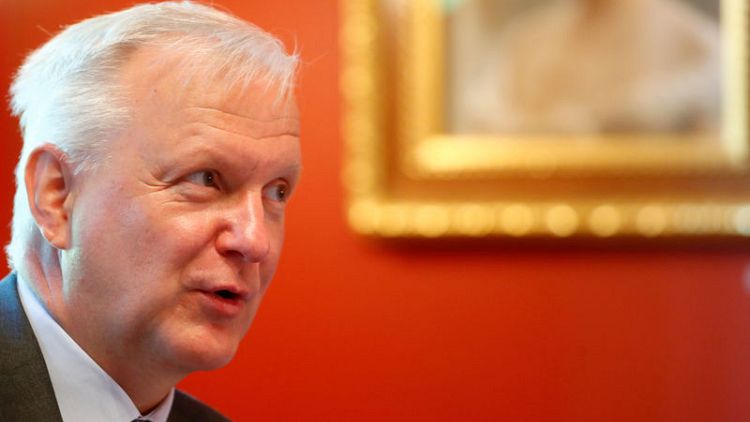FRANKFURT (Reuters) - The European Central Bank needs to review how it conducts policy given its failure to lift inflation back to target despite years of extraordinary stimulus, Finnish central bank chief Olli Rehn said on Friday.
Economic fundamentals may have shifted in the post-crisis years, reducing the ECB's ability to influence consumer prices and potentially damaging its credibility, said Rehn, who sits on the ECB's rate-setting Governing Council.
With inflation well below the ECB's target of almost 2 percent since 2013, the bank has provided unprecedented support via record low interest rates, 2.6 trillion euros worth of bond purchases and several rounds of ultra-cheap funding for banks. But this has nearly exhausted its policy arsenal, only for inflation to underperform its target year after year.
"The interdependence of economic activity and inflationary pressures seems to have weakened in recent years," said Rehn, who is often mentioned by economists as a potential candidate to succeed ECB President Mario Draghi later this year.
"Should this phenomenon prove to be lasting, it would imply a weakening of the impact monetary policy exerts on inflation via aggregate demand," he added.
Rehn noted that even as the ECB used unprecedented tools to raise inflation, the desired results did not materialise and expectations for price growth continued to sink, a worrisome phenomenon.
"One explanation for this is that... trust in central banks’ ability to influence the inflation rate may have eroded," he added.
Adding to the case for a review, Rehn argued that interest rates may stay low for long, limiting the central bank's ability to use interest rates as a policy tool and forcing it to rely on unconventional tools, which so far have failed to yield the desired effect.
"Naturally, this would not mean questioning the primary objective of price stability, but it would indeed entail a comprehensive review of the guiding principles, key assumptions and tools used for the implementation of monetary policy," Rehn added.
While central banks around the world conduct periodic reviews of their policy framework, ECB chief economist Peter Praet recently said "now may not be the right time" for such a study.
With half of the ECB's board and more than a third of its Governing Council due to be replaced this year, the ECB is undergoing its biggest change in years, with potential implications for policy.
(Reporting by Anne Kauranen; Writing by Balazs Koranyi; Editing by Hugh Lawson)



